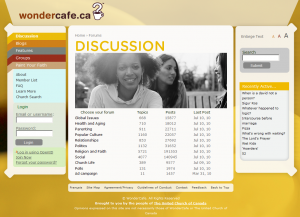 It’s challenging being a mainstream Christian church these days, in Canada. Declining membership, aging congregations, questions about relevancy, not to mention dealing with the Indian residential school legacy, witness Canada’s Truth and Reconciliation Commission.
It’s challenging being a mainstream Christian church these days, in Canada. Declining membership, aging congregations, questions about relevancy, not to mention dealing with the Indian residential school legacy, witness Canada’s Truth and Reconciliation Commission.
Yet, paradoxically, there is opportunity. Opportunity to reach out, engage, dialogue, explore new possibilities. This is the approach The United Church of Canada (United Church) takes, evidenced by its Emerging Spirit and Wonder Cafe initiatives.
Last week, I connected, over the phone, with Aaron McCarroll Gallegos, Executive Producer of the Emerging Spirit and WonderCafe initiatives, at his United Church office in Toronto. Aaron generously responded to my questions.
(Note: I am not a member of the United Church. I discovered these initiatives through family who are though, and wanted to learn more.)
About the United Church
Founded in 1925, today it is the largest Protestant church, and 2nd largest Christian church (after Roman Catholic), in Canada. 2008 United Church statistics indicate there are about 300,000 members, and 2.8 million adherents. It operates on a bottom-up governance model. The policies of the United Church are generally seen as inclusive and liberal. It has a rich tradition of being at the forefront of social change in Canada.
Emerging Spirit
Emerging Spirit is an initiative of the United Church focused on establishing and nurturing a relationship between the United Church and Canadians who don’t attend church, especially those between the ages of 30 and 45, the generation largely missing from United Church congregations (and other churches too). Emerging Spirit was launched, as a 5-year program, in 2006. Key components include a national media campaign (which has largely run its course), congregational training and leadership events (still ongoing), and WonderCafe.ca, an on-line discussion forum (still ongoing and very active).
Wonder Cafe
WonderCafe was a big jump, by the United Church, into social media. The heartbeat of WonderCafe is discussion forums, on all manner of topics (no holds barred here!). Currently, WonderCafe has about 7,000 registered users, 40,000 unique visitors/month, and several hundred active users at any one time. Anonymous users are allowed. Although discussions are moderated, the policy is to be as hands-off as possible, thus providing a neutral ground for open discussions.
As further introduction to the WonderCafe, check out this short, engaging video, sponsored by the United Church (if you can’t see it, click here)
Observations and discoveries
- The largest WonderCafe user group has been (as targeted) 30-45 years, next biggest is 46-59, then 19-29; the ratio of United Church / non-church users is approximately 60/40
- As audience familiarity with the online medium increases, so does the level of engagement
- Many of the conversations are social in nature, people wanting connection, in and/or out of Church; many conversations bridge age groups
- WonderCafe is as open as any denominational site, anywhere; e.g., there is a large atheist contingent participating on the site
- Minster and lay leaders have been very active in the discussions
- As things happen online as they do in church, is WonderCafe itself a (new) church?
- WonderCafe is sharing new ways to do church beyond (Sunday) service; e.g., community services, volunteerism
- Many of the online conversations are carrying on to in-person; coffee and conversations; WonderCafe Live
- Didn’t expect the United Church to be changed as much as it has (by the WonderCafe experiences)
- Confirmed church isn’t seen as a mainstream part of society question of relevancy
Going forward
- Given the positive response to the WonderCafe program, it will likely be extended into other social media outposts (note: U.S. religion researcher Phyllis Tickle suggests that 70 million Americans find spiritual nourishment online first)
- While WonderCafe will continue, the Emerging Spirit initiative ends within the year. What new initiatives/programs will emerge?
- Given many Christian churches face similar challenges, the United Church has had peer-to-peer conversations with other denominations. Working collaboratively, what common-ground solutions can be shaped? (no mean feat considering historical differences between the churches)
- How will the United Church’s recent collective online experiences impact individual congregations?
What thoughts do you have about the United Church approach to community engagement?
If you enjoyed this post, please consider leaving a comment or subscribing to my blog. Thanks, Ben.

Although I am a lay reader in the Anglican Church, I do occasionally get to attend services at the local United Church. How sad to learn the day I discovered Wondecafé.ca that it is going to close at the end of the month. As a progressive Christian I have to preach once or twice a month to much more conservative people. I’m always looking for ways to encourage very small congregation without offending them. I don’t proselytize as our people have long since formed their own Christian beliefs.
Hi Eva,
Thanks for sharing your experience. The Wondercafe was a bold move to engage both Church members and the broader public. Keeping an online community active and successful, though is very difficult, for any type of community or organization. And, what with our short attention spans…! Good luck in your communications, with your community/congregation.
I heard Wondercafe was closing so I took a look before that happens. It’s the first time. I’m too old for new technology. I never know where/what to click on at websites. I’d rather read the Observer magazine, go to discussion and study groups at my church, and have face-to-face contact with people. I also watch and listen to TV and radio programs, and borrow books, tapes or DVD’s from the library. So Wondercafe has not been useful to me. But I would have thought younger people would love it, so it’s too bad it is closing down. Perhaps it will work better in the future. Anyway I’m still glad I joined the United Church, whatever the problems. Best wishes.